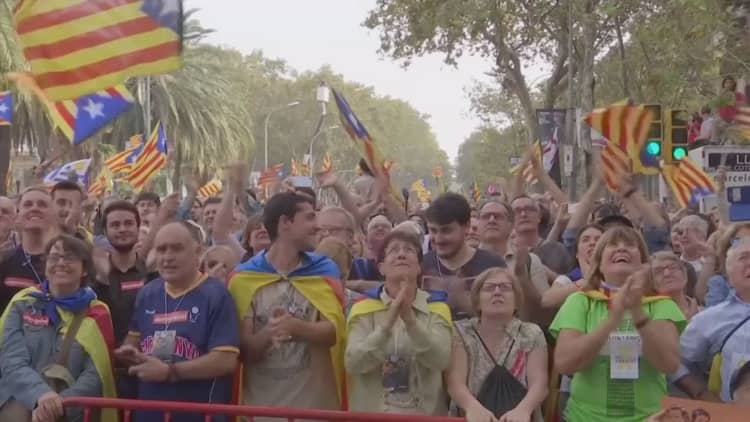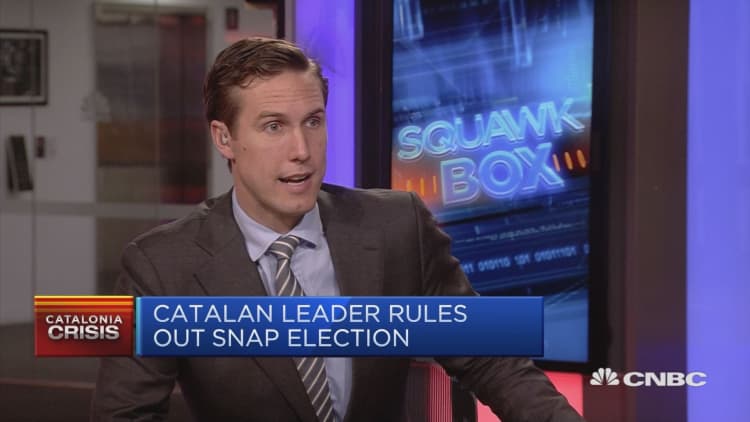
The regional parliament of Catalonia declared independence from Spain on Friday, just minutes before Madrid officially imposed direct rule on the region.
The independence motion passed in the Catalan assembly in Barcelona with 70 votes in favor, 10 against and 2 blank ballots, according to Reuters. The parliament is typically 135 members strong but politicians from the Socialist Party, the People's Party (PP) and the Ciudadanos party abstained in protest.
Spain's IBEX closed the Friday trading session down about 1 percent with Spanish banks leading the losses. At 4:30 p.m. Madrid time (11:30 a.m. EDT), the euro had dipped below the $1.16 handle and was about 0.6 percent lower for the session.

In response, Spanish Prime Minister Mariano Rajoy took to Twitter: "I ask for calm from all Spaniards. The rule of law will restore legality in Catalonia."
Shortly afterward, the Spanish Senate granted Madrid the power to implement Article 155 of the constitution. The two paragraph-long clause allows Madrid to remove the Catalan government, install a technocratic government and call new regional elections. Rajoy said temporary control of Catalonia could last as long as six months.
On Saturday, the official publication of the decision will effectively trigger direct rule, but it's unclear how this could immediately manifest itself.
The immediate response from the European Union also came via Twitter. Donald Tusk, president of the European Council, said Brussels would only talk to Madrid.
Antonio Barroso, deputy director of research at Teneo Intelligence, said in a note Friday that the Rajoy administration will now move quickly to dismiss the separatist leader Carles Puigdemont from his post as Catalan president. Barroso added that he expected this move to increase tension and provoke fresh clashes between police and pro-independence demonstrators.
Rift between Madrid and Catalonia
The decision by the Catalan parliament in Barcelona to announce a split from the rest of Spain was expected. Declaring independence unilaterally will likely increase the rift with Madrid but is unlikely to change anything in practical terms, according to some officials.
"It would be so illegal (to declare independence); they (Catalan lawmakers) even risk jail," a European official from Catalonia, who is close to the discussions but didn't want to be named due to the sensitivity of the issue, told CNBC via phone on Friday morning.
Speaking at the Senate, Rajoy said Friday morning: "In Catalonia there have been attempts to ignore the laws, abrogate them, to not follow them."
"What occurred on the 6 and 7 of September in the Catalan Parliament was the biggest joke to democracy, when two illegal laws were passed and a referendum was called," he said. On Sept. 6, the Catalan parliament approved the scheduling of an independence referendum. It said a vote for independence would be binding with a simple majority and that no minimum turnout was required.

Before the Madrid declaration to impose central authority under Article 155, Barclays said in a note Friday that it was not guaranteed that the central government would be able to immediately exercise full control of regional executive powers.
"Catalonia has a very high degree of self-government, comparable with some of the most decentralized regions in Europe and elsewhere," Barclays said in the note.
Catalonia has full responsibility in such areas as civil law, police, education, health care, industry, trade, consumer affairs, environment, research, local government, tourism, transport and media.
Crisis a long-time coming
The political crisis had been long coming. There has been a strong sense of separatism and regional identity in Catalonia, a wealthy region in the northeast of Spain, for decades. There have also been several unrecognized and unofficial referenda on independence in recent years.
The latest vote took place Oct. 1 — 90 percent of 2.26 million regional voters opted for independence. Turnout was low at around 43 percent, however, and thousands of Catalans also took to the streets to protest against independence.
Puigdemont caused confusion following the vote by appearing to declare independence and then immediately suspending it in an attempt for dialogue with Madrid, a request that was denied. His request for the European Union to mediate in the dispute also fell on deaf ears, with the EU supporting the Rajoy government and saying it would not recognize an independent Catalonia.
On Thursday, Puigdemont decided not to call a snap election in the region.
-CNBC's Holly Ellyatt contributed to this article.




